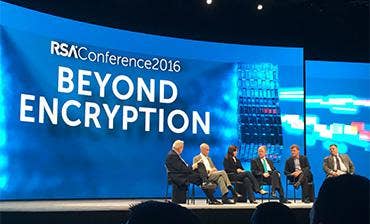RSA Panel: Apple-FBI Battle Is Bigger Than A Tug-Of-War Over Encryption

As the controversy surrounding Apple and the FBI continues to heat up, a panel of tech industry leaders, privacy experts and former top government officials at the 2016 RSA Conference said the debate is about something much bigger: how government and privacy fit into the new digital age.
"The issue of security and privacy is the defining issue of our age," said Art Coviello, former RSA executive chairman and now venture partner at Rally Ventures. "It's only a symptom of a larger issue. Whether we can solve it or not will determine if we are masters of the digital [era] or are its victims."
The panel, which took place Thursday night at the RSA Conference in San Francisco, included Coviello; Michael Chertoff, executive chairman and co-founder of The Chertoff Group and former Secretary of the U.S. Department of Homeland Security; Mike McConnell, senior executive adviser at Booz Allen Hamilton and former director of National Intelligence; Nuala O'Connor, president and CEO of the Center for Democracy and Technology; and Trevor Hughes, president and CEO of the International Association of Privacy Professionals.
[Related: Apple-FBI Debate Center Stage At 2016 RSA Conference]
The debate between Apple and the FBI centers around the FBI's demands, backed by a court order, for the technology giant to open an encrypted iPhone belonging to one of the shooters involved in the San Bernardino terrorist attacks. However, Apple says it will need to create a new operating system to fulfill the court order, something it has so far refused to do. The debate has taken center stage in the nation, with a congressional hearing Tuesday as well as ongoing discussion at the RSA Conference this week.
The panelists agreed that the debate represents a bigger conversation than just the tug-of-war between Apple and the FBI over encryption. Rather, they said, it is about how the government will balance security and privacy in the digital age.
"It isn’t a question of one phone, it’s a question of all of our phones, all of our devices and our country," O'Connor said. "There are ramifications for the world we envision in the technology sector and the security sector."
That debate will only grow with each new emerging technology entering the market, especially with the Internet of Things, Chertoff said. Encryption technologies will be critical to protecting new connected devices, he said, and, at the same time, they will raise new questions about privacy.
"Without trust, the economic opportunity of the Internet will be squandered," Chertoff said. "These are important discussions not just for people who are advocates, but everyone who worries about security."
These types of conversations have always happened when new technologies have emerged, Hughes said. What makes the digital age different, he said, is the sheer pace of change. With each new technology, the government will have to have a continuous discussion around "reframing and resetting the norms of privacy," he said.
"I think the technology will continue to challenge our expectations of privacy and continue to change our expectations of privacy," Hughes said.
However, the panelists agreed that pitting privacy and security against one another is a false dichotomy. The two can co-exist peacefully if both parties agree to engage in a thoughtful and open-minded discussion, they said. McConnell urged the audience of security professionals to have a "dialogue, not a debate" with the government, with an objective to find the most concrete set of recommendations and compromises that address the issue.
"By and large, the public at large is not informed on this issue," McConnell said. "An informed set of informed dialogues ... will [create] a more engaged dialogue."
Multiple members of the panel urged for that conversation to happen in Congress, rather than in the courts. That will promote transparency and allow for a public discussion on the issue, they said.
"This is a new era. That is a new technology development. The intimate connection [of these devices] really raises the stakes," Hughes said. "It demands the type of open dialogue that has been asked for on the panel today."